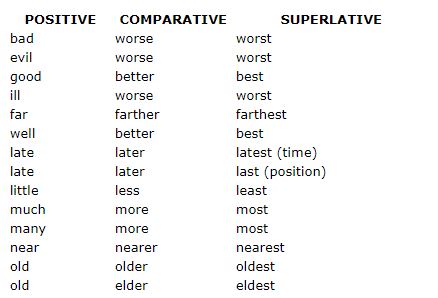Rangkuman Materi Bahasa Inggris Kelas 8 Bab 9
Chapter 9: Bigger is not always better.
In this chapter we are going to learn :
(Di materi ini kita akan mempelajari : )
- Compare people, animals and things.
- Degrees of comparison.
Lets start! (mari mulai!)
Degrees of Comparison
Degrees of comparison used to compare one thing with other thing.
(Degrees of comparison digunakan untuk membandingkan satu hal dengan hal lainnya)
Type of Degrees of Comparison
There are two type of degrees of comparison:
(Degrees of comparison terbagi dua macam, yaitu: )
- comparative
- superlative
Comparative
We use comparative to show that one thing is “more” than one other thing.
(Kita gunakan comparative untuk menunjukkan satu hal lebih daripada satu hal lainnya)
Remember in comparative we only compare 2 things only.
(Ingat dalam comparative kita hanya membandingkan dua benda saja)
In comparative we use :
- -er
- More
Rules of Comparative
There are rules for using comparative:
- if the word contain one syllables we use “-er”
- (jika kata mengandung hanya satu suku kata, kita gunakan “-er”)
- if the word contain more than two syllables we use “more”
- (jika kata mengandung lebih dari dua suku kata, kita gunakan “more”)
- if the word ending with “y” and has the consonant before it, we change the “y” to “i” and added “-er”.
- (jika kata berakhiran “y” dan memiliki huruf konsonan sebelumnya, kita ubah “y” menjadi “i” dan tambahkan “-er”)
- if the word ending with consonant and has the vowel before it, we doubled the consonant and added “-er”.
- (jika kata berakhiran konsonan dan memiliki huruf vokal sebelumnya, kita gandakan konsonannya dan tambahkan “-er”)
Examples of Comparative
Here below are examples of comparative with one syllable :
(Berikut ini beberapa contoh dari comparative dengan satu suku kata)
- small > smaller
- fine > finer
- dry > drier
- big > bigger
All above example only have one syllable, so we just added “-er” in the end of word.
(Contoh diatas hanya terdiri dari satu suku kata, jadi kita gunakan akhiran “-er”)
Here another examples of comparative with more than one syllables:
- active > more active
- attractive > more attractive
- careful > more careful
All above example have more than one syllable, so we just added “more” in front of the word.
(Contoh diatas lebih dari satu suku kata, jadi kita gunakan “more” didepan huruf tersebut)
Actually really easy to determine how much syllable on the word.
(Sebetulnya sangat mudah untuk menentukan berapa suku kata dalam sebuah kata)
We just need to say it, if say it with one spelling then its mean one syllable, otherwise more than one syllable.
(Kita hanya tinggal mengucapkannya, jika ketika mengucapkan hanya satu kali tanpa terputus maka terdiri dari satu suku kata, sebaliknya berarti lebih dari satu suku kata)
Superlative
We use superlative to show that one thing is “more” than all the other thing.
(Kita gunakan superlative untuk menunjukkan satu hal lebih daripada semua hal lainnya)
In comparative we use :
- -est
- Most
Rules of Superlative
There are rules for using superlative:
- if the word contain one syllables we use “-est”
- (jika kata mengandung hanya satu suku kata, kita gunakan “-est”)
- if the word contain more than two syllables we use “most”
- (jika kata mengandung lebih dari dua suku kata, kita gunakan “most”)
- if the word ending with “y” and has the consonant before it, we change the “y” to “i” and added “-est”.
- (jika kata berakhiran “y” dan memiliki huruf konsonan sebelumnya, kita ubah “y” menjadi “i” dan tambahkan “-est”)
- if the word ending with consonant and has the vowel before it, we doubled the consonant and added “-est”.
- (jika kata berakhiran konsonan dan memiliki huruf vokal sebelumnya, kita gandakan konsonannya dan tambahkan “-est”)
Examples of Superlative
Here below are examples of superlative with one syllable :
(Berikut ini beberapa contoh dari superlative dengan satu suku kata)
- small > smallest
- fine > finest
- dry > driest
- big > biggest
All above example only have one syllable, so we just added “-est” in the end of word.
(Contoh diatas hanya terdiri dari satu suku kata, jadi kita gunakan akhiran “-est”)
Here another examples of comparative with more than one syllables:
- active > most active
- attractive > most attractive
- careful > most careful
All above example have more than one syllable, so we just added “most” in front of the word.
(Contoh diatas lebih dari satu suku kata, jadi kita gunakan “most” didepan huruf tersebut)
Special Case
Some adjectives are have different form than what we learn above.
(Beberapa kata sifat memiliki bentuk yang berbeda dari yang sudah kita pelajari)
Just remember it okay?
(Tinggal dihapalkan saja ok?)

